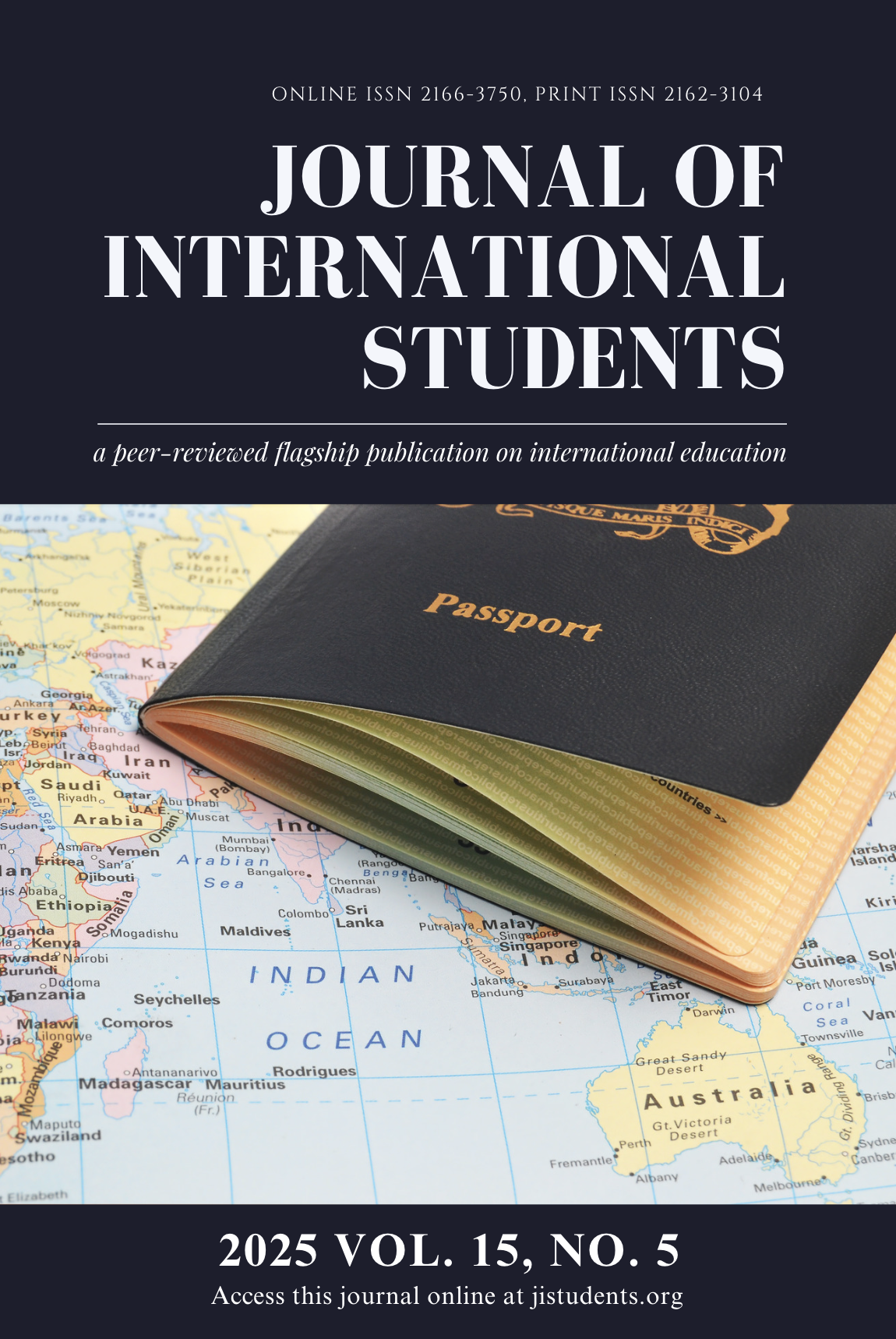Examining barriers and facilitators of graduate international students in the U.S.
DOI:
https://doi.org/10.32674/b6bgby16Keywords:
international students, graduate international students, cultural adjustment, acculturation barrerite resilience, AI mentorship and international students, peer mentoringAbstract
As international student enrollments surge in U.S. higher education, understanding their experiences is crucial for fostering an inclusive and successful environment. This study used a hermeneutic phenomenological approach to explore the challenges and coping strategies of international students during acculturation. Data were collected through in-depth interviews with eight international graduate students from diverse backgrounds at a large U.S. public research-based university. An inductive, hermeneutic approach revealed six main challenges: 1) cultural differences and adjustment, 2) practical and daily living, 3) academic and educational, 4) mental health and well-being, 5) linguistics and communication barriers, and 6) lack of resources. Students reported resilience strategies and four main coping mechanisms and needs for better adjustment: 1) building connections and social support, 2) cultivating resilience and personal development, and 3) leveraging technology and media. The findings of this research highlight the importance of social support and self-resilience for international students.
References
Aichhorn, N., & Puck, J. (2017). "I just do not feel comfortable speaking English": Foreign language anxiety as a catalyst for spoken-language barriers in MNCs. International Business Review, 26(4), 749-763.
https://doi.org/10.1016/j.ibusrev.2017.01.004.
Berry, J. W. (2005). Acculturation: Living successfully in two cultures. International Journal of Intercultural Relations., 29(6), 697-712.
https://doi.org/10.1016/j.ijintrel.2005.07.013.
Berry, J. W. (2006 The Cambridge handbook of acculturation psychology, second edition. DOI: 10.1017/CBO9781316219218.
Berry, J. W. (1997). Immigration, acculturation, and adaptation. Applied Psychology: An International Review, 46(1), 5-34. https://doi.org/10.1111/j.1464-0597.1997.tb01087.x
Berry, J. W., Kim, U., Minde, T., & Mok, D. (1987). Comparative studies of acculturative stress. International Migration Review, 21(3), 491-511. https://doi.org/10.2307/2546607
Creswell, J. W., & Poth, C. N. (2018). Qualitative inquiry and research design: Choosing among five approaches. Sage Publications.
Crisp, G., Baker, V. L., Griffin, K. A., Lunsford, L. G., & Pifer, M. J. (2017). Mentoring undergraduate students: ASHE higher education report, volume 43, number 1. John Wiley & Sons.
Denson, C., & Bayati, N. (2023, June). Augmented Botswanan Learning Experience. In 2023 ASEE Annual Conference & Exposition.
Etikan, I., Musa, S. A., & Alkassim, R. S. (2016). Comparison of convenience sampling and purposive sampling. American Journal of Theoretical and Applied Statistics, 5(1), 1-4. https://doi.org/10.11648/j.ajtas.20160501.11.
Forbes-Mewett, H., & Sawyer, A. M. (2016). International students and mental health. Journal of International Students, 6(3), 661-677. https://doi.org/10.32674/jis.v6i3.569.
Hammarberg, K., Kirkman, M., & de Lacey, S. (2016). Qualitative research methods: When to use them and how to judge them. Human Reproduction, 31(3), 498-501. https://doi.org/10.1093/humrep/dev334.
Hegarty, N. (2014). Where we are now—The presence and importance of international students to universities in the United States. Journal of International Students, 4, 223-235.
Hirai, R., Frazier, P., & Syed, M. (2015). Psychological and sociocultural adjustment of first-year international students: Trajectories and predictors. Journal of Counseling Psychology, 62(3), 438-452. https://doi.org/10.1037/cou0000085.
Hovey, J. D., & Magaña, C. G. (2002). Cognitive, affective, and physiological expressions of anxiety symptomatology among Mexican migrant farmworkers: Predictors and generational differences. Community Mental Health Journal, 38(3), 223-237. https://doi.org/10.1023/A:1015215723786.
Hwang, B. J., Bennett, R., & Beauchemin, J. (2014). International students' utilization of counseling services. College Student Journal, 48(3), 347-354.
Institute of International Education. (2023). Open doors 2023: Report on international educational exchange. https://opendoorsdata.org
Khawaja, N. G., & Stallman, H. M. (2011). Understanding the coping strategies of international students: A qualitative approach. Journal of Psychologists and Counsellors in Schools, 21(2), 203-224.
Kim, B. S. (2007). Acculturation and enculturation. Handbook of Asian American psychology, 2, 141-158.
Krämer, A., Prüfer-Krämer, L., Stock, C., & Tshiananga, J. T. (2004). Differences in health determinants between international and domestic students at a German university. Journal of American College Health, 53(3), 127-132. https://doi.org/10.3200/JACH.53.3.127-132
Lannin, D. G., Vogel, D. L., & Heath, P. J. (2021). Self-stigma and mental health literacy as predictors of help-seeking intentions in undergraduates. Journal of Counseling Psychology, 68(2), 151-160. https://doi.org/10.1037/cou0000516.
Lee, M. Y., Wang, X., Kirsch, J., & Eads, R. (2023). Mentoring international students in social work doctoral programs. Journal of Social Work Education, 59(3), 681-698. https://doi.org/10.1080/10437797.2022.2119355.
Lincoln, Y. S., & Guba, E. G. (1985). Naturalistic inquiry. SAGE Publications.
Mason, A., & Hickman, J. (2019). Students supporting students on the PhD journey: An evaluation of a mentoring scheme for international doctoral students. Innovations in Education and Teaching International, 56(1), 88-98. https://doi.org/10.1080/14703297.2017.1392889.
Merriam, S. B., & Tisdell, E. J. (2016). Qualitative research: A guide to design and implementation (4th ed.). John Wiley & Sons.
NAFSA: Association of International Educators. (2023). The economic value of international students. https://www.nafsa.org/policy-and-advocacy/policy-resources/nafsa-international-student-economic-value-tool-v2.
Peoples, K. (2021). How to write a phenomenological dissertation: A step-by-step guide. SAGE Publications.
Perry, C. J. (2016). Comparing international and American students’ challenges: A literature review. Journal of International Students, 6(3), 712-721. https://doi.org/10.32674/jis.v6i3.569.
Pinarbasi, G. (2023). International Students’ Sociocultural Adaptation Experiences: Their Perceived Stress and Coping Strategies. Journal Of Academic Social Resources, 8(55), 4059-4080.
Poyrazli, S., Kavanaugh, P. R., Baker, A., & Al-Timimi, N. (2004). Social support and demographic correlates of acculturative stress in international students. Journal of College Counseling, 7(1), 73-82. https://doi.org/10.1002/j.2161-1882.2004.tb00261.x.
Ra, Y. A., & Trusty, J. (2015). Coping strategies for managing acculturative stress among Asian international students. International Journal for the Advancement of Counseling, 37, 319-329.
Reinert, M., Fritze, D., & Nguyen, T. (2022, October). The state of mental health in America 2023. Mental Health America. https://mhanational.org/issues/state-mental-health-america
Reynoso, N. A. (2008). Academic resiliency among Dominican English-language learners. Community College Review, 36(2), 129-144. https://doi.org/10.1177/0091552108319731.
Schneider, J. K., Bender, C. M., Madigan, E. A., & Nolan, M. T. (2020). Facilitating the academic success of international PhD students. Nursing Education Perspectives, 41(1), 20-25.
Tracy, S. J. (2013). Qualitative research methods: Collecting evidence, crafting analysis, communicating impact. Wiley-Blackwell.
U.S. Department of Homeland Security. (2024). Optional practical training (OPT) data.
Downloads
Published
Issue
Section
Categories
License
Copyright (c) 2025 Journal of International Students

This work is licensed under a Creative Commons Attribution-NonCommercial-NoDerivatives 4.0 International License.
All published articles are licensed under a Creative Commons Attribution-NonCommercial-NoDerivs 4.0 Unported License.















